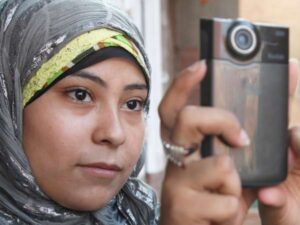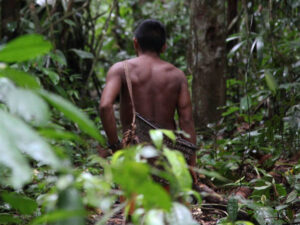The Biodiversity Funders Group (formerly Climate and Energy Funders) supports, facilitates, and seeks to expand a global network of funders responding to climate change. The organization helps climate and energy foundations and a small number of individual donors work together to fund more effectively.
Paige Brown of Biodiversity Funders Group spoke with Jessica Kantor on December 18, 2023. Click here to read the full conversation with insights highlighted.
Jessica Kantor: Can you introduce yourself and the organization that you’re with and describe the problem that you’re working to solve and how you are addressing it?
Paige Brown: I’m Paige Brown and I manage the Climate and Energy Funders Group. It is a network of donors funding or considering funding in climate and clean energy advocacy.
Our purpose is to help stop the climate crisis and move to a just and effective rapid clean energy transition. Our role in that ecosystem is to help climate and energy foundations and a small number of individual donors work together, learn together, and understand the landscape and context of climate and clean energy policy, as well as advocacy barriers. The theory is that by working and learning together, they build connections either to communicate and fund more effectively by knowing what each other is doing, and then often also collaborate, or at least coordinate funding around priority areas.
Jessica Kantor: How are you engaging with the community that you’re working with?
Paige Brown: Well, I suspect every network does very similar things. So, we have, of course, since 2020, leaned on online more, but we’ve always had roughly monthly webinars that can be on a variety of topics, like federal policy, global climate policy, community solar, or whatever idea or approach we think would be worth testing out or we think everybody needs to know about, even if they only fund in Ohio. We do monthly webinars. We have an annual convening that brings together most of climate philanthropy. The core purpose of that is networking, but also, again, to lay the groundwork for the coming year and touch on what we think [is important], in what is a pretty broad field. Topics that are either urgent or underappreciated.
The elevator pitch version of that is one, we help funders learn and connect by having online and in-person convenings and meetings. The second piece, again, touches very high level on a broad range of topics. And then third, at any given time we facilitate work groups or coordination, that may be short or longer term, which you might think of as initiatives or campaigns, such as around one of the global conferences of the parties. We run two regional working groups, the Midwest Climate and Energy Funders Group and a Northeast one. We have a work group on democracy and climate. So the first thing is keeping a 101 level. Then, at any given time, we run and help funders within a shared interest geographically or strategically to work together and coordinate and learn on a deeper level.
Jessica Kantor: And how are you tracking your success?
Paige Brown: In terms of metrics, basically we ask how’s our membership? Up or down? One. Two, attendance at our online convenings. Are people showing up? Do they have an appetite for what we’re offering? Numbers at our in-person convenings. And then, it gets a little more anecdotal. We choose or try to put forward something that we in our leadership team think is important, like supporting democracy. So we’ve had a big push to connect climate donors to voting rights and citizen engagement, voter engagement activities. So, we’ll ask, “Did you shift money? Did anything happen?” [This is done to get a] sense of if we can find some evidence that what we focused on did help shift some money in a direction we think was critical.
And then, similarly on the anecdotal front, we also, after our convenings and throughout the year, have a funding survey. We ask, “Have there been any partnerships, funding shifts, connections, or something that happened as a result of you taking part in our activities?”
Jessica Kantor: Do you have a lot of people that engage in those surveys and complete them fully? And do you have strong metrics that you pull from that on average?
Paige Brown: I think our metrics are more participation. Because democracy was a new field, we did try to track foundations that weren’t previously funded in it and who did. That’s very difficult. We have pretty good uptake on our annual funding survey. We got around 100 funders. The post-convening surveys frankly frustrate me, but they are important. And I understand, I don’t want to do a survey always after a meeting. But in the meetings, we pay a lot of attention. So, you get 30 to 40 people responding, and that can really kind of shift things in terms of what’s of interest, and what hasn’t or didn’t work.
Jessica Kantor: Do you have a story, one of those anecdotes that you could share about the impact of the work that you guys are doing?
Paige Brown: I think one thing that is not always so seeable is, assuming you know climate philanthropy enough, there is a lot of concentration at the top, and 10 funders are 90% of the money. That’s not exactly, but that’s right enough. They have their own center of gravity. They don’t need, really, to talk to the others. We have 140 funders on the list. They don’t need to talk to folks. But they along with their monetary resources have great informational resources. So what we have been able to do is build enough connections with the bigger donors, particularly when they have an interest in helping the field. I think we have served as an efficient connector between the bigger donors and medium and small. And I would say one anecdote is some of the really large nationals, like the Energy Foundation.
Then one of the other large national donors we’re starting to fund in Ohio. They, not for bad reasons, but just hadn’t connected with the Cleveland Foundation or the Gund Foundation who only fund in Ohio. And through our meeting and also through, frankly, just my connection with those two funders and the larger ones, we were able to convene a call. And now there’s a very, I think, robust partnership that helps the national effort and has certainly helped the in-state funders, Gund and Cleveland.
That was just a connection and knowing where funding was going, knowing the players, and then building enough trust and capital that when we were like, “Hey, you should talk…”Yes, this is, to you, a tiny funder, but deeply embedded in the state, understanding the advocates, the dynamics. And they credited us, so that was how that came to be. I think that’s one thing we really try to be a conduit for, particularly information resources from bigger donors to medium ones. But then, sometimes a smaller donor’s very rooted in place and has connections and understanding that a larger one not in place doesn’t have.
Jessica Kantor: Do you think that you guys are working with a distinct approach, setting yourself apart from others in that particular space?
Paige Brown: Well, that would’ve been easier to answer a few years ago. I think all the funder networks have a little bit of a personality and approach that is not always stated, but everybody does climate now. I don’t think anyone does it with quite the approach, set of connections, and appetite for debate on the best strategy [as we do]. We put debates on the agenda. It is something that as the only network specifically worrying on climate, I didn’t really think about. Now I do look at the many climate-related offerings from our funder network colleagues.
Jessica Kantor: Every social innovator learns as much from things that don’t work as much as they do from things that do. Is there anything that either early on or even recently, the fund or the group tried and just didn’t pan out and is a lesson that you learned that maybe others could learn from as well?
Paige Brown: The lesson learned part is interesting. In the work groups we talked about, we have spun off or ended as many as we’ve kept going or started. This was the one where we really tried to drag its carcass across the finish line. But we have such a vibrant Midwest climate group and a Northeast group, and there is a committed core in the Southeast. And we tried to create, in various ways, a work group or consistently coordinated body. But with almost anything in philanthropy, the goal is to get new folks, even if it’s not stated. We just had the same seven people talking about the same seven things for a long time. I think we tried the best we could. I think it’s okay to end things, is what I learned from that.
We had a goal of getting new donors, and that didn’t happen. Maybe try again, but be willing to put your resources somewhere else. And then, we’ve had a number, again, it’s more in the work group function, where we had a carbon pricing work group. Carbon taxes cap and trade with a fee. And I think we can come in as an organizing body when it’s helpful. Often they have a neutral entity. So if you have a few stronger players, or there’s nobody who can take on the organizing and facilitating, we’re good at that. But sometimes there’s one or two donors that have something they’re very passionate about, and they think by routing it through us, they can get more people passionate about it because it’s such a great idea, and it doesn’t work. And they often don’t step in. So I would say at least in our world, having one to two [funders]. And it’s not exactly how it sounds coming from that. But we really need one to two funders who work with us who are leaders and who will step out. We need one of their peers in the mix ideally too.
Jessica Kantor: It sounds like you want funders who are going to continue their engagement in the community alongside you, and not just partner with you in a loose capacity, provide funding, and then step away and let you guys do all the work?
Paige Brown: Yeah. Or say, “Here’s a great idea. Spread the gospel, and they will come,” without really engaging with us. Because particularly if we’re in so many different issues and geographies, we also need the expertise. I mean, there’s two learnings. One, we need a funder lead. And two, I’ve learned this even in our light-touch things, like the one-off webinar, beware a hobby horse.
A hobby horse is when one person has something they are just so attached to. So, just make sure it’s not one person’s passion. You need a handful of [voices]. Just beware of the hobbyhorse.
Jessica Kantor: In that same vein, are there any challenges that you haven’t been able to overcome aside from raising sufficient funding, which is a challenge that every innovator faces constantly?
Paige Brown: We do raise enough funds. We’re not a grant maker. We are a grant seeker, but just to run our programs. This is recent, but I think the rise of mega donors has made our sweet spot of connecting funders harder. It’s a very relational, relationship-building field. And also, the pandemic, all these things change and you haven’t been able to really talk to people in-person or meet, so I think some of that is still working itself out and how to bring in climate mega donors into and see themselves as part of an ecosystem.
Jessica Kantor: Are you working to advance systems-level change?
Paige Brown: Sure, but I mean the system is the entire global energy system, and there’s many theories of change in that. They’re not all working directly at the global energy system. Some folks are working in Ohio to try to get cities to get IRA money when the state wants to stop it at all costs. There are a lot of levels and intervention points into that system. And then, where is it boundaried? What’s the system too? I don’t think we will make progress on climate if we continue to lose our democracy. So that’s another system that’s huge. Huge money, but I think it’s the enabling one.
Jessica Kantor: What’s most needed from either your partners directly or just other actors in the space in order to advance either a global systems change like you mentioned, or even just a national systems-level change in the United States? Is it more funding? Is it more lobbying efforts?
Paige Brown: I think more funding. There’s a lot of debate. Why did Waxman-Markey fail? Why did this happen? Without squarely looking at the amount of fossil fuel money that has infected the political system for more than decades. So more money, but I think as well a willingness to engage in various ways in what is a bare knuckle fight. I remember we had a session and annual meeting, and solar energy is more popular than kittens! So, solar’s great. What is not to like about solar? It is now subject to a misinformation attack campaign. So, there’s nothing popular enough.
Who really opposes solar, unless you’re an incumbent energy industry or you’re an ideologue? I think seeing that logic is really insufficient. The science is insufficient. It’s not irrelevant, but I think many had, and I include myself as one, thought once we felt the impacts of climate, we would understand the science, but we can’t even have a shared science of a virus. So, really understanding that this is a bare-knuckle fight at every step of the way. And I have heard, “Oh, carbon taxes. Republicans will love it.” People are looking for something magic that I just think is not there. It will not be there.
Jessica Kantor: With that in mind, how do you see the work that you all are doing evolving over the next five years?
Paige Brown: Well, we could roll it out to five, but the next year, as I tend to think more in year increments, since everything could change late next year, this next year is about implementing and moving the billions of federal climate dollars and helping funders figure out and do that as rapidly as possible. And then, secondly, in a C3 way, but democracy is the underpinning of climate action and a number of other things, certainly. We’re going to shift more resources into that direction and help funders in our network know where and how to fund. Just push on those two things in the next year.
Jessica Kantor: For the sake of this conversation, it being an interview that is going to be shared with other social change entrepreneurs, academics, researchers, journalists, students, so that they can understand what has worked and what has not worked for your specific model, is there anything else relevant to the conversation that you think is important to add for them to gain insights?
Paige Brown: Beware of the silver bullet.
Jessica Kantor: Beware the silver bullet. Beware the hobbyhorse.
Paige Brown: Yeah. Which often comes guised as a silver bullet.
Jessica Kantor: You mentioned you have your funders, you have your core community, but your goal is also to continuously bring more people into the loop. So any thoughts on inspiration or education to bring more people in?
Paige Brown: Well, there are entities in our world that were designed more than we were to bring in new money. I think what we do is provide a home that makes people want to stay in the field. What helps people is there’s this, like I mentioned, this bare knuckle fight. But there’s really also an amazing vision when you talk about a transition to a clean energy economy and all that potentially brings in terms of human health, planetary health. Fossil fuel companies are behind a lot of the anti-democratic work and attacks on women’s rights, LGBTQ+ rights.
So taking that money out of the system and hoping we won’t ever have big solar that quashes everybody. There’s a really positive vision and I think that brings people to the table as well. That we’re not just stopping a bad, you kind are telling the story of how things could be. And I think people are social, they like to be together. Some of our really successful efforts and where funders start to gel and work together, there’s a joy in working together. So how do we lure big donors and medium. The joy of doing something together and hashing it through is real.
Jessica Kantor: Wonderful, thank you so much for talking with me.
Click here to read the full conversation with insights highlighted.
Jessica Kantor is an independent journalist specializing in health, human rights, and social impact. Her work can be found in Fast Company, Healthcare Quarterly, The Las Vegas Review-Journal, and others. She is a living kidney donor.
* This interview has been edited and condensed.
Learn about other philanthropic organizations that provide social innovation in funding.






